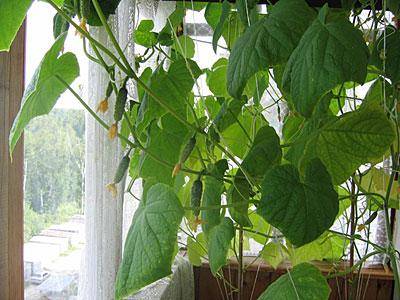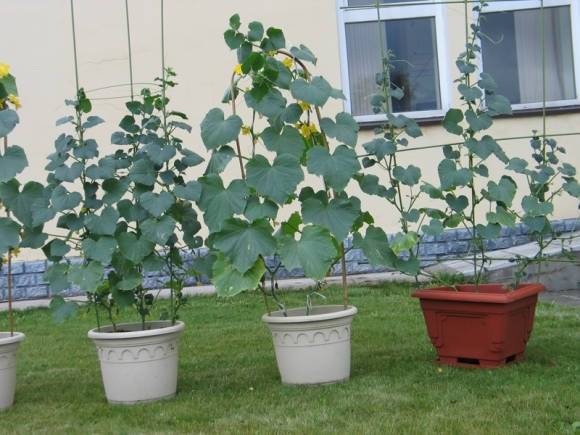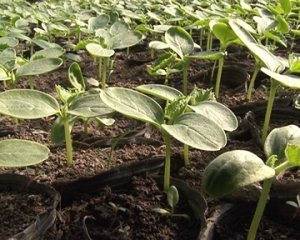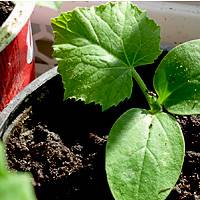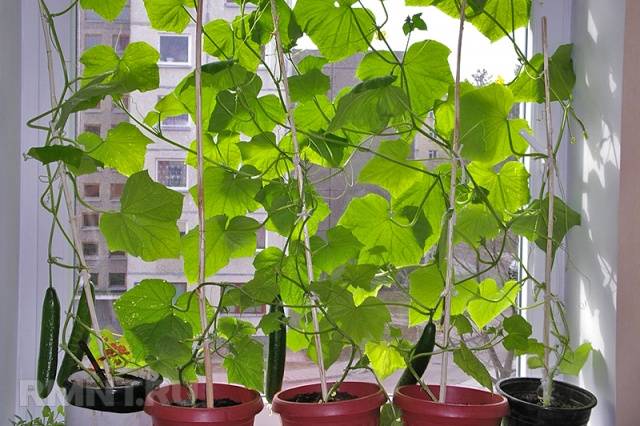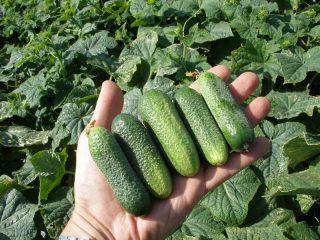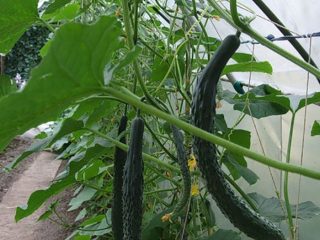Content
How lucky are those apartment owners who, in addition to it, also have a loggia. Or, in extreme cases, a glazed balcony with insulation around the perimeter. This is exactly the case when a winter garden can be created in an ordinary city apartment.
It remains to choose a variety of cucumbers and add some knowledge from the field of special agricultural technology for growing vegetables on a loggia.
First, let it be ordinary good quality cucumbers, whose liana-like greenery will turn an ordinary city apartment with a loggia into a real decorative oasis. The evening illumination of cucumbers growing on the loggia, against the background of the first spring vegetation, will make this oasis fabulous.
Fundamentals of agricultural technology and first knowledge
A warm, glazed loggia is a kind of attached greenhouse. It has its own microclimatic characteristics. At the same time, each variety of cucumbers requires maintaining their own climate.
Good soil is the beginning of all beginnings
If the idea of creating a winter garden on the loggia came not in the middle of winter, but at least in late autumn, then preparing the soil for cucumbers will not be difficult. This requires only:
- base of soil;
- special soil additives at the rate of 10 liters: urea - ordinary urea 1 teaspoon, without a slide, spoon; wood ash 200 gram, ordinary glass; complex fertilizer - in the form of nitrophoska usual for gardeners, 2 teaspoons, without a slide, a spoon;
- the acidity created under the cucumbers of the soil should not deviate from the pH values in the range of 6.6 ÷ 6.8 for the extract from the water. Otherwise, the composition of the new soil for cucumbers will have to be adjusted.
- good results when growing cucumbers on a loggia, gives a water-retaining additive in the form of an agrogel.
The purchase of a ready-made vegetable mixture will be somewhat costly, but the implementation of the idea of growing modern cucumbers will not be postponed until spring.
Flower pots, plastic containers - like plots of land for cucumbers
The soil prepared for growing cucumbers should be stored on the loggia, avoiding freezing. At the same time, assuming the planting of cucumbers at the end of February, you should worry about their permanent place of residence. Large 2-bottomed flower pots are suitable for this purpose. Their capacity should not be less than 5 liters.
In the future, as the cucumbers of the selected variety grow, the free part of the pot will need to be filled with fertile soil. Cucumbers can be placed on the free area of the loggia at the rate of - 3 pcs. by 1.0 m2... Cucumbers of the selected variety are best placed on the floor so that they do not have to be lowered from various stands in the future.
The beginning of life or the first seedling
The dimensionless New Year's holidays are long gone. Studying the variety of seed bags and leafing through recommendatory articles from the very, greatest connoisseurs of agricultural technology in growing cucumbers fill all their free time.
By choosing varieties of cucumbers for a loggia, you need to pay attention to their compliance with the conditions of future growth. The microclimate of the loggia is characteristic:
- insufficient lighting. The problem is solved by using phytolamps on the loggia. Using any other lamps will also give good results. The duration of the illumination of cucumbers on the loggia should not be less than 12 hours. From cucumbers to lamps should be about 200 mm;
- small cultivated area;
- critical temperature changes on the loggia;
- the absence of pollinating insects on the loggia. Parthenocarpic varieties will come in handy. They do not need pollination and they do not form seeds, self-pollinated cucumbers also do not need insects and pollinators.
Balcony cucumber varieties
Of the well-proven samples, the most popular varieties for the loggia should be distinguished:
F1 parthenocarpic cucumber cultivar "City gherkin":
- begins to bear fruit 40 days after germination;
- cucumbers up to 10 cm long and weighing about 90 g;
- up to 9 ovaries of good quality cucumbers are formed in the nodes.
F1 parthenocarpic cucumber cultivar "Balcony":
- begins to bear fruit 40 days after germination;
- cucumbers up to 12 cm long and weighing about 90 g;
- up to 9 cucumber ovaries are formed in the nodes;
- cold-resistant
F1 parthenocarpic cucumber cultivar "Balagan":
- determinant type;
- begins to bear fruit 40 days after germination;
- cucumbers up to 10 cm long and weighing about 90 g;
- 4 - 6 cucumber ovaries are formed in the nodes;
- shoots are small, weak branching.
Preparing seeds for planting
When the seeds are selected and the first decisive step has already been taken, it is no longer possible to stop. To continue the started event is already a matter of honor:
- seeds are pickled in a weak solution of potassium permanganate for 12 hours at a temperature of +200C;
- all pickled seeds must be spread out on a damp cloth at a temperature not lower than +230C by placing it on the appropriate pallet. It is necessary to moisturize the napkin regularly for 2 days. When the first signs of germination appear, prepare pots or cups for planting.
When shoots appear, the cups with seedlings must be placed on the windowsill of the lightest window, maintaining the temperature regime: from +23 in the daytime0From to +260C, at night not lower than +160C. Light cycle - 12 hours with additional lighting.
Raising seedlings
The first leaves that appear inspire, but do not allow the home vegetable grower to relax. Barely noticeable green sprouts are so weak that even a simple draft can destroy them.
During this period of their life, they need special care and attention:
- Watering. With good lighting and intensive growth up to 2 times in 7 days;
- Backlight. From 8 am to 8 pm;
- Growing time. Seedlings can be transplanted within 26 - 28 days;
- Top dressing. The first feeding after a 2-week period, the second and last feeding of seedlings - after a week after the first feeding.
The approximate composition of top dressing is as follows: 20 parts of double superphosphate, 15 parts of ammonium nitrate, 15 parts of potassium sulfate. Calculated in grams, this is sufficient for 15 plants.
Time to move to the loggia
After about one month, it is time to transplant seedlings to their permanent place on the loggia. In prepared-sized cups with seedlings, carefully lower the sprout, while trying not to damage the roots.
At this time, cucumbers do not require complex care:
- Compliance with temperature conditions:
- Organization of sufficient illumination and duration of illumination;
- Systematic watering. Twice a week at the rate of 2.5 liters of water at normal temperature;
- Regular feeding at least once every 10 days;
- Installation of trellises to the full height of the loggia;
- Systematic pinching and pinching of cucumbers. When the height of the cucumbers takes up the entire height of the trellis, it must be pinched, all the shoots growing on the side are pinched to a length of up to 45 cm.
Just one month of cares that are inconspicuous to prying eyes, and by the spring the loggia takes on a fabulous shape. It is difficult to take your eyes off the unusual sight of blooming cucumbers behind the glazing of the loggia. Grateful plants will delight their owners for a long time not only with beauty, but also with a good harvest.
